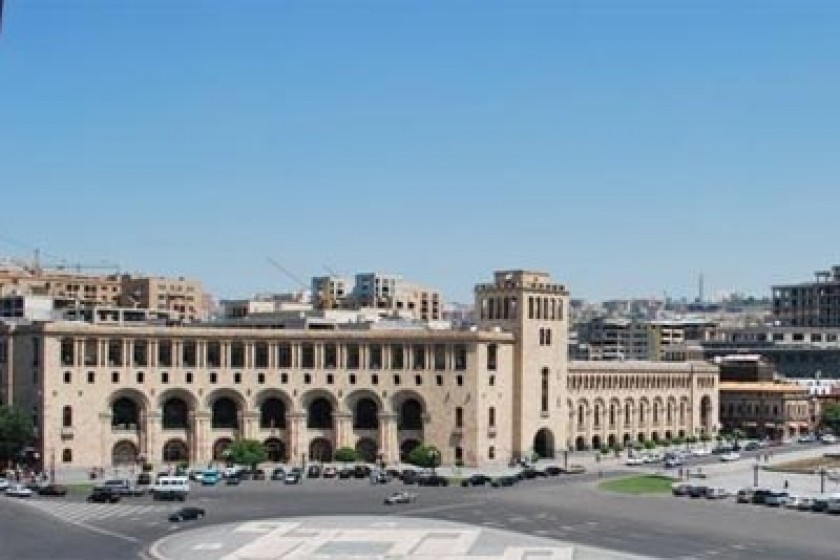
The Ministry of Foreign Affairs and the Humanities
We all know that our country's foreign policy is very weak. The anti-Armenian course of Karabakh negotiations, Safarov's extradition and, of course, Azerbaijan's election to the United Nations Security Council are the undisputed proof of that.
Of course, the results of our diplomats' inactivity can be discussed for a long time, and the diplomats would be criticized a lot. Therefore, let's discuss other aspects of the issue.
As we know, together with other departments, Yerevan State University has faculties of Oriental studies, foreign relations and law, where future diplomats are made.
The faculties of foreign relations and law
It is known that the faculties of foreign relations and law are traditionally considered "the most prestigious" and, at the same time, the most corrupt faculties in Yerevan State University. When, according to international criteria and the state committee of science, the most qualified recruits are "made" in the faculties of natural sciences (physics, biology, etc.), the faculties of foreign relations and law are swarming with corruption.
The staff of professors and lecturers of both these faculties (unlike the faculties of physics, chemistry and biology) publishes zero articles in internationally reviewed journals annually. Of course, sometimes there are deviations from that number, but the picture shows that these faculties are a far way off from international science.
Obviously, both these faculties of the "mother university," which are separated from international science and symbolize the model of corruption, can't provide qualified specialists of international law and diplomacy to the homeland.
The faculty of Oriental Studies is not enough
The situation is relatively better in the faculty of Oriental studies, which includes chairs of Turkic, Arab and Iranian studies. That is very good not only from a scientific point of view but also a practical one. Our country (the Ministry of Foreign Affairs) certainly needs specialists and scientists who understand Turks, Iranians and Arabs.
But it is not a revelation that our country is associated or has relations not only with Turkey, Azerbaijan, Arab countries and Iran but also with Georgia, Russia, the US, France, Israel and other countries. Active relations are being pursued with China.
Now let's try to find just one specialist on Georgia, Russian, the US, France, Israel or China… You probably won't succeed.
In other words, there is no one in our country that would understand as a expert the weak and strong sides of these countries and the methodology of dealing with them. There is no specialist who can finally scientifically say what the policy is towards Armenians in Georgia, how to be independent from Russia, what expectations the US has from this region, what can we obtain from the love of the French for us, what can we learn from the processes happening in Israel and what will be developing China's role in our region in the years to come.
Politicians, dilettantes and diplomats, but not specialists in these countries, are trying to answer all these important questions (as, for example, in Turkey's case).
It is accepted all over the world that a country prepares specialists of those countries with whom that country communicates. The outstanding example of this is the former US Secretary of State Condoleezza Rice who was a specialist on the Soviet Union and Russia.
Why did it happen this way?
The training of regional specialists was accepted in the USSR as well. The Soviet authorities were aware that "you have to know your enemy, all the more so your friend." Specialists on these different countries were trained all over the Soviet Union. Regarding specialists on Oriental studies, the "responsibility" was logically placed on Yerevan State University.
As a result, Oriental studies were basically the only direction in humanities that was developed in the Soviet Union. And specialists on the US, Europe and China were prepared mainly in Moscow and Leningrad.
But after independence, when an independent foreign policy started, logically we should have slowly developed an institute of specialists on the US, Europe, Israel and China and, naturally, created courses for training specialists on Georgia and Russia.
But not only did that not happen, there was no intention of doing it. The Ministry of Education and Science or the Ministry of Foreign Affairs hasn't actually even thought about creating sciences that study these regional trends.
Thus, if those in the Ministry of Education and Science don’t understand the importance of humanities for the country, let's hope that it will be understandable in the Ministry of Foreign Affairs, where there is a need for specialists in that field.
Let's hope that one bright day this neglected situation in the humanities will improve a little more in accordance with the order of the Ministry of Foreign Affairs, with the replenishment of specialists on different countries/regions as well as the imperative to have qualified diplomats and specialists on international law.
 Videos
Videos Photos
Photos




Write a comment